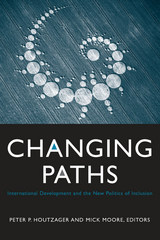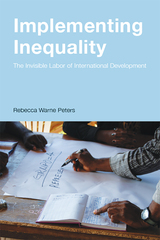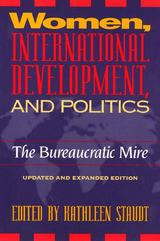3 books about International Development

Changing Paths
International Development and the New Politics of Inclusion
Peter P. Houtzager and Mick Moore, Editors
University of Michigan Press, 2005
After two decades of marketizing, an array of national and international actors have become concerned with growing global inequality, the failure to reduce the numbers of very poor people in the world, and a perceived global backlash against international economic institutions. This new concern with poverty reduction and the political participation of excluded groups has set the stage for a new politics of inclusion within nations and in the international arena. The essays in this volume explore what forms the new politics of inclusion can take in low- and middle-income countries. The contributors favor a polity-centered approach that focuses on the political capacities of social and state actors to negotiate large-scale collective solutions and that highlights various possible strategies to lift large numbers of people out of poverty and political subordination.
The contributors suggest there is little basis for the radical polycentrism that colors so much contemporary development thought. They focus on how the political capabilities of different societal and state actors develop over time and how their development is influenced by state action and a variety of institutional and other factors. The final chapter draws insightful conclusions about the political limitations and opportunities presented by current international discourse on poverty.
Peter P. Houtzager is a Fellow at the Institute of Development Studies, University of Sussex. He has been a visiting scholar at the Center for Latin American Studies, University of California, Berkeley, visiting lecturer at Stanford University, and lecturer at St. Mary's College. A political scientist with broad training in comparative politics and historical-institutional analysis, he has written extensively on the institutional roots of collective action.
Mick Moore is a Fellow at the Institute of Development Studies, University of Sussex, as well as Director of the Centre for the Future State. He has been a visiting professor at the Massachusetts Institute of Technology. His professional interests include political and institutional aspects of poverty reduction and of economic policy and performance, the politics and administration of development, and good government.
[more]

Implementing Inequality
The Invisible Labor of International Development
Rebecca Warne Peters
Rutgers University Press, 2020
Implementing Inequality argues that the international development industry’s internal dynamics—between international and national staff, and among policy makers, administrators, and implementers—shape interventions and their outcomes as much as do the external dynamics of global political economy. Through an ethnographic study in postwar Angola, the book demonstrates how the industry’s internal social pressures guide development’s methods and goals, introducing the innovative concept of the development implementariat: those in-country workers, largely but not exclusively “local” staff members, charged with carrying out development’s policy prescriptions. The implementariat is central to the development endeavor but remains overlooked and under-supported as most of its work is deeply social, interactive, and relational, the kind of work that receives less recognition and support than it deserves at every echelon of the industry. If international development is to meet its larger purpose, it must first address its internal inequalities of work and professional class.
[more]

Women, International Development
And Politics
edited by Kathleen Staudt
Temple University Press, 1997
In the seven years since the first edition of this book, global attention has focused on some remarkable transitions to democracy on different continents. Unfortunately, those transitions have often failed to improve the situation of women, and democratic practices have not included women in government, homes, and workplaces.
At the same time, non-governmental organizations have continued to expand a policy agenda with a concern for women, thanks to the Fourth World Congress on Women and a series of United Nations-affiliated meetings leading up to the one on population and development in Cairo in 1994 and, most important, the Beijing Conference in December 1995, attended by 50,000 people.
Two new essays and a new conclusion reflect the upsurge of interest in women and development since 1990. An introductory essay by Sally Baden and Anne Marie Goetz focuses on the conflict over the term "gender" at the Beijing Conference and the continuing divisions between conservative women and feminists and also between representatives of the North and South.
At the same time, non-governmental organizations have continued to expand a policy agenda with a concern for women, thanks to the Fourth World Congress on Women and a series of United Nations-affiliated meetings leading up to the one on population and development in Cairo in 1994 and, most important, the Beijing Conference in December 1995, attended by 50,000 people.
Two new essays and a new conclusion reflect the upsurge of interest in women and development since 1990. An introductory essay by Sally Baden and Anne Marie Goetz focuses on the conflict over the term "gender" at the Beijing Conference and the continuing divisions between conservative women and feminists and also between representatives of the North and South.
[more]
READERS
Browse our collection.
PUBLISHERS
See BiblioVault's publisher services.
STUDENT SERVICES
Files for college accessibility offices.
UChicago Accessibility Resources
home | accessibility | search | about | contact us
BiblioVault ® 2001 - 2024
The University of Chicago Press









